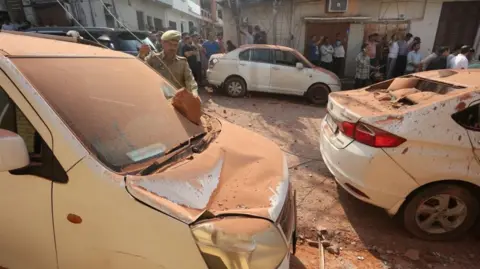India and Pakistan agree ceasefire after days of strikes
 EPA
EPAIndia and Pakistan have said they have agreed to a ceasefire after four days of escalating cross-border military strikes.
The news was announced on social media by US President Donald Trump who said the "full and immediate ceasefire" had happened after US mediation.
However, hours after the announcement, residents and reporters in the main Indian-administered Kashmiri cities of Srinagar and Jammu reported hearing the sounds of explosions, although neither India or Pakistan has commented on them.
In the last few days there has been a series of drone and missile attacks since Delhi launched attacks against Islamabad over the killing of Indian tourists by militants in the Indian-administered Kashmir region. Pakistan had denied any involvement.
Kashmir is claimed in full by India and Pakistan, but administered only in part by each since they were partitioned following independence from Britain in 1947.
It has been a flashpoint between the two nuclear-armed nations and they have have fought two wars over it.
Speaking on Saturday, India's external affairs minister S Jaishankar said the two nations had "worked out an understanding on stoppage of firing and military action".
"India has consistently maintained a firm and uncompromising stance against terrorism in all its forms and manifestations. It will continue to do so," he added.
Pakistan's Deputy Prime Minister Ishaq Dar said: "Pakistan has always strived for peace and security in the region, without compromising on its sovereignty and territorial integrity."
India's strikes on Wednesday sparked a chorus of calls for de-escalation from the international community.
China had urged both countries to prioritise peace and stability and a statement from G7 nations called for "maximum restraint".
Speaking after the ceasefire announcement, US Secretary of State Marco Rubio said India and Pakistan had agreed to start talks on a broad set of issues at a neutral site.
He said he and US Vice-President JD Vance spent the prior 48 hours with senior Indian and Pakistani officials, including their respective Prime Ministers Narendra Modi and Shehbaz Sharif.
UN Secretary General Antonio Guterres said he welcomed "all efforts to de-escalate the conflict".
UK Prime Minister Sir Keir Starmer said Britain has been "engaged" in talks for "some days", with Foreign Secretary David Lammy speaking to both sides.
"I'm pleased to see today that there's a ceasefire," he said. "The task now is to make sure that that is enduring and is lasting."
The recent fighting came after two weeks of tension following the killing of 26 tourists in the resort town of Pahalgam.
Survivors of the 22 April attack in Indian-administered Kashmir, which killed 25 Indians and one Nepali national, said the militants were singling out Hindu men.
The Indian defence ministry said its strikes this week were part of a "commitment" to hold "accountable" those responsible for the attack. Pakistan described them as "unprovoked".
Pakistan says Indian air strikes and cross-border fire since Wednesday have killed 36 people in Pakistan and Pakistan-administered Kashmir, while India's army reported at least 21 civilians deaths from Pakistani shelling.
Fighting intensified overnight on Friday, with both countries accusing each other of targeting airbases and other military sites.
India's military said Pakistan had launched mass drone attacks and shelling along its western border, endangering civilians - a claim Pakistan denied.
Pakistan said it had taken retaliatory action for Indian missile strikes on airbases at Rawalpindi - 10km (6.2m) from Pakistan's capital Islamabad - Chakwal and Shorkot.
